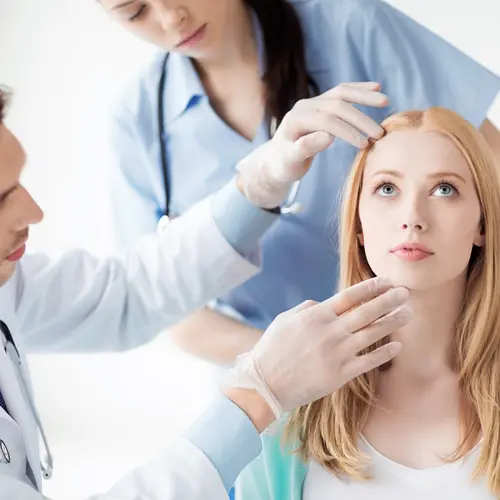Table of Contents
Mental health has a significant impact on physical appearance, reflecting the inseparable connection between mind and body.
Research suggests that mental health conditions such as stress, anxiety, and depression can manifest physically, leading to various changes in appearance.
For instance, individuals experiencing chronic stress may exhibit premature aging signs such as wrinkles, dull skin, and hair loss. Moreover, mental health issues can affect personal grooming habits, diet, and exercise routines, further influencing one's overall physical well-being.
Understanding the correlation between mental health and physical appearance is crucial for promoting holistic wellness and encouraging individuals to prioritize mental health care as a vital component of their self-care routine.
Skin problems related to mental health
Skin problems related to mental health can have a significant impact on physical appearance. Stress, anxiety, and other mental health issues can trigger skin conditions such as acne, eczema, psoriasis, and rosacea.
This is due to the close relationship between the skin and the mind, known as the "brain-skin connection." When a person experiences emotional stress or turmoil, it can lead to the release of stress hormones like cortisol, which can in turn exacerbate inflammation in the skin, leading to breakouts or flare-ups of existing skin conditions.
Furthermore, individuals struggling with mental health issues may also engage in habits that can negatively affect their skin, such as picking at their skin due to anxiety or neglecting proper skincare routines.
Lack of sleep, poor diet choices, and decreased physical activity often associated with mental health problems can also impact skin health. It is essential for individuals dealing with mental health issues to prioritize self-care, including skincare routines, healthy lifestyle choices, and seeking professional help if needed.
By addressing the underlying mental health concerns, individuals can also improve their skin health and overall physical appearance.
Skin problems related to mental health can manifest in various ways:
- Acne breakouts triggered by stress hormones
- Exacerbation of eczema or psoriasis due to inflammation
- Rosacea flare-ups caused by emotional distress
- Compulsive skin-picking leading to scarring
- Poor skincare habits due to mental health struggles
Weight fluctuations due to mental health issues
Weight fluctuations due to mental health issues can have a significant impact on physical appearance. Mental health challenges such as stress, anxiety, depression, and eating disorders can all contribute to changes in body weight.
For some individuals, mental health issues might lead to weight loss due to decreased appetite, neglect of proper nutrition, or increased physical activity as a coping mechanism.
On the other hand, some people may experience weight gain as a result of emotional eating, comfort eating, or hormonal changes triggered by stress and anxiety.
These weight fluctuations not only affect the number on the scale but also manifest in physical appearance.
Rapid weight loss or gain can result in changes in muscle mass and distribution of body fat, leading to a difference in body shape and overall silhouette. Additionally, individuals dealing with mental health issues may neglect personal grooming habits, skin care, or overall self-care routines, further impacting their physical appearance.
Overall, the connection between mental health and physical appearance is complex and multifaceted.
It is essential to address both mental and physical well-being concurrently to achieve a balanced and healthy lifestyle.
Seeking professional help, practicing self-care, maintaining a balanced diet, and engaging in regular physical activity are all crucial steps in managing the impact of mental health on physical appearance.
Hair loss and mental health
Hair loss can be a common physical symptom related to mental health issues.
The Impact of Mental Health on Physical Appearance is a complex topic that highlights the interconnectedness of our psychological well-being and outward appearance.
When it comes to hair loss specifically, several mental health conditions can contribute to this phenomenon.
- Stress is a major factor that can lead to hair loss. High levels of stress trigger hormonal changes in the body, which can disrupt the normal hair growth cycle and result in hair thinning or even bald patches.
- Anxiety and depression are also linked to hair loss, as these conditions can lead to behaviors such as pulling or twisting hair, which can damage the follicles.
- Conditions such as trichotillomania, a compulsive hair-pulling disorder often associated with anxiety, can result in significant hair loss over time.
- Certain medications used to treat mental health issues can have side effects that include hair thinning or loss.
It is essential to address the underlying mental health issues to effectively manage hair loss in these situations.
Seeking support from mental health professionals, practicing stress-reducing techniques, and using hair care products recommended by healthcare providers can help improve both mental well-being and physical appearance.
Impact of stress on physical appearance
Stress can have a significant impact on physical appearance, affecting various aspects of our body both internally and externally. When it comes to the relationship between mental health and physical appearance, stress plays a crucial role.
Here are some ways in which stress can impact physical appearance:
- Skin Health: Stress can lead to various skin issues such as acne, eczema, psoriasis, and premature aging. This is because stress triggers the release of cortisol, which can increase oil production in the skin and cause inflammation.
- Hair Health: Chronic stress can contribute to hair loss, thinning, and graying. Stress disrupts the hair growth cycle and can lead to conditions like telogen effluvium, where hair prematurely enters the shedding phase.
- Weight Changes: Stress can impact appetite and eating habits, leading to weight gain or weight loss. Emotional eating or lack of appetite due to stress can result in changes in body weight.
- Posture and Muscle Tension: Chronic stress can cause muscle tension and poor posture, leading to neck, shoulder, and back pain. This can affect overall body posture and appearance.
- Overall Vitality: Stress can contribute to a tired and worn-out appearance, affecting the brightness of the eyes, the vibrancy of the skin, and overall vitality.
Remember, managing stress through relaxation techniques, regular exercise, proper nutrition, and seeking support can help mitigate these physical effects. Take care of your mental health to maintain a healthy physical appearance.
Dark circles, bags under the eyes, and mental health
Dark circles and bags under the eyes are commonly associated with factors such as lack of sleep, stress, and fatigue, all of which can be linked to mental health issues.
The impact of mental health on physical appearance is significant, as our external appearance often reflects our internal well-being.
Mental health conditions, such as anxiety and depression, can lead to poor sleep quality and disrupted sleep patterns, resulting in the development of dark circles and under-eye bags.
Chronic stress, commonly experienced by individuals with mental health concerns, can also contribute to the appearance of these physical symptoms.
Furthermore, the relationship between mental health and physical appearance extends beyond dark circles and under-eye bags.
Skin conditions such as acne, eczema, and psoriasis have been linked to stress and anxiety, highlighting the intricate connection between our mental and physical well-being.
Taking care of our mental health is essential not only for our overall well-being but also for maintaining a healthy physical appearance.
Seeking professional help, practicing self-care, getting an adequate amount of sleep, and managing stress effectively are all crucial steps in fostering a positive relationship between mental health and physical appearance.
Poor hygiene habits and mental health
Poor hygiene habits can have a significant impact on physical appearance and are often closely linked to mental health issues.
When a person is struggling with their mental health, they may find it challenging to maintain proper hygiene routines. This can manifest in various ways, such as neglecting to shower regularly, forgetting to brush teeth, or failing to wash hands frequently.
These poor hygiene habits can lead to visible signs on the individual's physical appearance, including body odor, greasy hair, skin breakouts, and yellowed teeth.
Individuals experiencing mental health challenges may also lack motivation or energy to take care of their appearance, further exacerbating the issue.
This can result in a lack of self-care and grooming, which can be noticed by others and may contribute to a negative self-image.
In addition, the stigma and shame associated with mental health problems can make it difficult for individuals to seek help or open up about their struggles, perpetuating a cycle of poor hygiene and deteriorating mental well-being.
It is essential to address mental health concerns and provide support to individuals experiencing difficulties in order to promote overall well-being and healthy self-care practices.
Encouraging open communication, seeking professional help when needed, and promoting self-care routines can all play a role in improving both mental health and physical appearance.
Effects of depression and anxiety on physical appearance
- Skin Problems: Stress and anxiety can exacerbate skin conditions such as eczema, psoriasis, acne, and rosacea.
- Weight Fluctuations: Depression can affect appetite, leading to weight loss or gain.
- Dark Circles and Puffiness: Lack of sleep can result in dark circles under the eyes and puffiness.
- Hair Loss: Chronic stress can contribute to hair loss or thinning.
- Posture and Body Language: Poor posture and closed-off body language may be exhibited.
- Neglect of Personal Care: Personal hygiene and grooming routines may be neglected.
- Physical Health: Overall health indicators such as pallor, fatigue, and lack of vitality may be affected.
Self-care and mental health maintenance for better physical appearance
One key aspect of maintaining physical appearance is understanding the impact of mental health on it. The state of our mental well-being can significantly influence how we present ourselves physically to the world.
Self-care practices and strategies for mental health maintenance play a crucial role in enhancing physical appearance as they contribute to overall well-being.
Self-care routines that prioritize mental health can lead to improved skin quality, reduced signs of aging, better posture, and a healthier body weight.
When individuals prioritize mental well-being, they are more likely to engage in activities that support their physical health, such as regular exercise, proper nutrition, and sufficient sleep.
This holistic approach to health and wellness not only fosters a positive self-image but also enhances one's physical appearance. Moreover, mental health maintenance helps individuals manage stress levels effectively.
High levels of stress can manifest physically through acne, hair loss, weight gain, and other issues that can detract from one's appearance.
By implementing stress-reducing techniques like meditation, mindfulness, and therapy, individuals can mitigate these negative effects and maintain a healthy and vibrant appearance.
In summary, the connection between mental health and physical appearance underscores the importance of prioritizing self-care practices and mental health maintenance. By nurturing our mental well-being, we can improve our physical appearance and radiate a healthy glow from within.
FAQ
What is the relationship between mental health and physical appearance?
Mental health can have a significant impact on an individual's physical appearance. When a person is experiencing mental health issues such as stress, anxiety, or depression, it can manifest in various ways on their body. For example, chronic stress can lead to skin problems such as acne, eczema, or psoriasis. Additionally, mental health conditions may also affect weight management, posture, and overall grooming habits.
How does poor mental health affect skin health?
Poor mental health can negatively impact skin health in several ways. Stress, anxiety, and depression can trigger inflammation in the body, leading to skin conditions like acne, eczema, and psoriasis. Furthermore, individuals experiencing mental health issues may engage in unhealthy coping mechanisms such as excessive scratching or picking at their skin, which can worsen existing skin problems.
Can mental health affect hair health and appearance?
Yes, mental health can impact hair health and appearance. Conditions like stress and anxiety can disrupt the hair growth cycle, leading to hair loss or thinning. Additionally, individuals experiencing mental health issues may neglect proper hair care routines, such as regular washing and conditioning, resulting in dull, damaged hair.
How does mental health influence weight management and body image?
Mental health plays a significant role in weight management and body image perception. Conditions like depression and eating disorders can affect appetite regulation, leading to weight gain or loss. Negative body image resulting from mental health issues can also contribute to unhealthy behaviors such as crash dieting, binge eating, or excessive exercise.
In what ways can mental health impact overall grooming habits?
Individuals struggling with mental health issues may experience a lack of motivation or energy to maintain their grooming habits. This can result in neglecting personal hygiene practices, such as bathing regularly, brushing teeth, or grooming hair. Poor self-care due to mental health can also affect one's confidence and self-esteem.
How can improving mental health positively affect physical appearance?
Improving mental health can have a positive impact on physical appearance. Addressing mental health concerns through therapy, medication, or lifestyle changes can help reduce stress levels, improve sleep quality, and enhance overall well-being. As mental health improves, individuals may feel more motivated to engage in self-care practices and maintain a healthy lifestyle, reflecting positively on their physical appearance.
What are some self-care strategies to support both mental health and physical appearance?
Self-care strategies that support both mental health and physical appearance include regular exercise, a balanced diet, sufficient sleep, stress management techniques (such as meditation or yoga), skincare routines, grooming habits, and seeking professional help when needed. Taking care of both the mind and body holistically can contribute to overall well-being and a positive self-image.
When should someone seek help if they notice a significant impact of mental health on their physical appearance?
If someone notices a significant impact of mental health on their physical appearance, such as persistent skin issues, hair loss, sudden weight changes, or neglect of grooming habits, it is important to seek help from a healthcare professional. Consulting a doctor, therapist, or dermatologist can help address underlying mental health concerns and provide appropriate treatment options to improve both mental well-being and physical appearance.




















